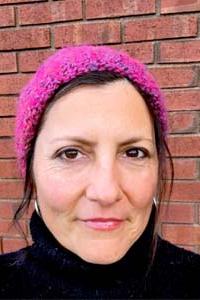Marina Moscoso Arabía (Human Geography and GRID Interdisciplinary Minor) is a member of the 23–24 graduate cohort for “Improvise and Intervene,” the second Interseminars project funded by the Mellon Foundation. She shares about her experiences with Interseminars below.
How has your understanding of “speculative practice” evolved over the course of this fellowship so far?
I would say that the fellowship, rather than having caused an evolution, has helped me validate what until recently was a kind of intuition about the unique potential of speculative practice as a tool for academic research and knowledge production. To a large extent, the same intuition led me to connect with the Interseminars call to Improvise and Intervene. So, it wouldn’t be crazy to say that I’ve been thinking and taking steps to integrate speculative practice into both my doctoral research and my professional career for at least a year. Now that I feel part of a community of speculative creators, researchers and scholars, what was an intuition has become a certainty. And that is fabulous given that this certainty is essential to generate the necessary security and confidence in oneself, to invest time in what you are really passionate about doing, and to guide the work to be done.
At this moment, I feel as if I have entered a spiral that will encourage, nourish and strengthen my ability to carry out speculative work even though I am not entirely clear about how I’m going to integrate speculative practice into the field of urban geography. The challenge, however, seems fascinating considering the theoretical and methodological wealth that has been produced within the broad field of human geography, particularly by critical feminist, abolitionist and decolonial scholars. Clearly, as a fellow, I must also work hard if I want to make the most of the stimulating environment and other support that the program offers me.
![Marina and Prof. David Harvey at the Casa Taft 169 project in Puerto Rico. [Photo courtesy Marina Moscoso]](http://publish.illinois.edu/inquiryblog/files/2023/11/Marina-with-David-Harvey.png)
How has the Interseminars initiative impacted the way you approach your research?
It seems to me that it is still too early to know how Interseminars has impacted or will impact the way I approach my research although the careful selection that our conveners have made so far of readings, audiovisuals and lectures has sparked new ideas in relation to my dissertation research as well as my academic work in general. This is due to the intellectual lucidity and expressive richness of many of these materials and resources. Similarly, having a regular exchange with a diverse group of exceptional people is having a very positive impact although at this moment it is difficult to predict how that will be reflected in my work.
Marina Moscoso Arabía“In addition to fueling my interest in speculative practice and particularly in improvisation as a speculative resource, Interseminars has made me feel optimistic about the possibility of using a tool as seemingly as far distant to human geography as comic art, as a way to interpreting, sharing and producing spatial knowledge.”
From a somewhat more pragmatic or logistical point of view, I can also say that given the financial support that the Interseminars provides for research, I am seriously considering the idea of conducting some of my research in New York City. One of the reasons behind this idea is that part of my research focuses on the history of the land squatting movement in Puerto Rico and part of that history is inextricably linked to the Nuyorican diaspora.
Can you describe a group interaction or activity from Interseminars that has been particularly memorable?
It might seem trivial, but what I find particularly memorable about Interseminars is that the backbone of the program is offering a small, heterogeneous group of people (i.e., from different backgrounds, different ages, trained in different academic disciplines, and with different personal and professional interests) the opportunity to maintain an ongoing dialogue over a long period of time. This implies the possibility of developing great affinity and camaraderie but also entails the possibility of generating tension and discomfort. Such a challenging yet rewarding opportunity is randomly available while pursuing graduate studies. To date, we have laughed, cried, had hard conversations, argued, danced… I believe that as a group we have been able to navigate all these emotions as we share the desire and willingness to care for each other as well as to care for the very precious space where we convene every week. Joe’s delicious and invaluable contribution to Interseminars, satisfying our stomachs and spirits with his delicious recipes for cakes, cookies and other sweets, deserves a special mention.
How will you bring interdisciplinary collaboration into the next phase of your graduate school experience?
The immediate answer on how to bring interdisciplinarity is simple: through improvisation. Seriously, despite being outside the scope of my research, I am very interested in improvising collaborative and novel ways of translating/interpreting multilingual and multitextual works as a way to spark and maintain conversations serving as bridges that connect the so-called Global North with the Global South, but also to build important South-South connections.
